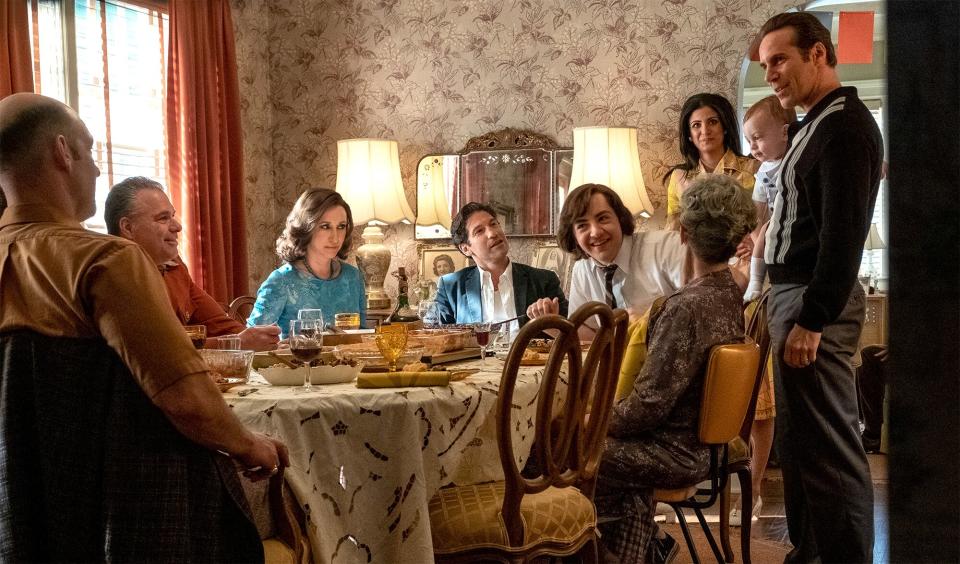The Many Saints of Newark review: A prequel with the spirit, if not full glory, of The Sopranos

- Oops!Something went wrong.Please try again later.
- Oops!Something went wrong.Please try again later.
To become a made man, somebody had to do the making. And it took a village to create Tony Soprano — or at least a good chunk of northern New Jersey, somewhere at the storied, spattered corner where crime and cannoli meet. The Many Saints of Newark begins there, though technically it starts in a cemetery: That's Michael Imperioli's Christopher Moltisanti narrating from beyond the grave, recalling his demise at the hands of his uncle Tony ("He choked me to death… but that was much later") and more importantly the wise guy, otherwise known as his own dad, who would shape his future murderer's rise. If you're a Sopranos fan you're already hooked; if you aren't, why are you here?
That's the overarching theme of Saints, a bada-boom drama that works well enough on its own, but whose whole reason for being — the intricate web of characters and mythology, meta winks and callbacks — comes from the show whose bloody, operatic excellence ruled television from 1999-2007. Its indelible star James Gandolfini is no longer with us, though the movie (in theaters and on HBO Max Oct. 1) has the next best thing in hereditary stunt casting — his real-life son, Michael Gandolfini. His portrait of the mobster as a young man is ostensibly at the center here, but in the end it's ancillary to the story Saints really wants to tell: the ballad of Dickie Moltisanti (Alessandro Nivola), a reluctant mafioso with bruised knuckles and a battered soul.

Barry Wetcher/Warner Bros. 'The Many Saints of Newark'
It's 1967 and Dickie's pugnacious father (Ray Liotta) is just getting started on a second family with his new Italian bride (the lovely Michaela De Rossi, who looks like a Sicilian Penelope Cruz), even if she's young enough to be his grown son's goomah. She is that soon enough, though Dickie already has a wife of his own and a thriving numbers business to run. He's also got an associate, Harold McBrayer (Leslie Odom Jr.), who brings in betting money from the Black side of town, though race relations in Newark are as incendiary as they were anywhere that year; there are riots and burning and looting in the streets, and not many kind words about it in the back rooms and card dens where the Soprano crew gathers.
To a kid like Tony — whose own dad (Jon Bernthal) is a blunt distracted goon and whose mother (a mournful, putty-nosed Vera Farmiga) is a joyless nag — Dickie is everything: Suave, calm, charismatic. What he doesn't know is how conflicted Dickie is by the choices he's made and the people he's hurt; a man who desperately wants to wipe his moral ledger clean, but keeps being reminded why that can never be. Sopranos creator David Chase co-wrote the script with alum Lawrence Konner, and they roll out the usual suspects accordingly — Pussy, Paulie Walnuts, Silvio — aged several decades down, along with the heady, familiar rhythms of gangster pathos and gallows humor that were the show's signature.
In more than a few moments — a walk on a winter beach, a warning bullet shot through the top of a startled bouffant — that feels like actual magic, recreated. (Who else could conjure the exquisite vanity of a dapper young hoodlum patiently lacquering his fingernails in clear gloss at the dinner table?). At other times it just feels like a tease: ten tons of backstory squeezed into a two-hour runtime. Nivola, soulful and tormented, lets whole weather systems of feeling skim across his face; a vivid, underused Odom hints at the (anti)hero of his own narrative he could have been. Great character actors like Corey Stoll and Billy Magnussen come and go, sometimes with a bang (or a drill, or a weaponized steering wheel) and the women are mostly left to pick up the pieces. Michael Gandolfini's tender, awkward Tony, too, is largely there to bear witness, a lost boy in a grownup's world. Saints can't be what Sopranos was — without the time or the ones who've been lost to tell it, fuggedaboutit. But for a hundred-something minutes, it feels close enough to coming home again. Grade: B+
Related content:

